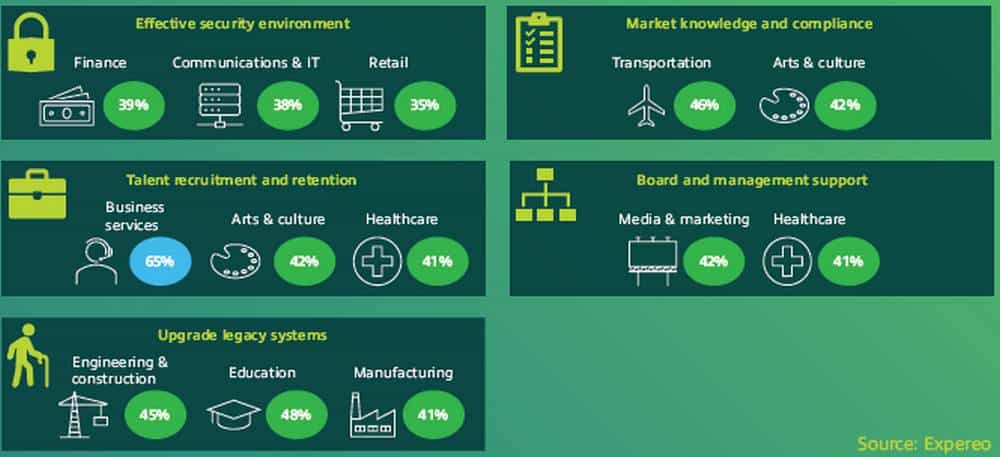The post-pandemic world has undoubtedly brought about significant changes in the way of working. One of the most significant is the widespread adoption of flexible working arrangements as the new normal, driven by the need for businesses to adapt to the changing dynamics of the workforce and the intense competition for talent, particularly in the face of global expansion ambitions.
According to Expereo's recent study on CIOs in Asia Pacific (APAC), large global enterprises’ ambitions for global growth are being constrained, 29% admit that they struggle to hire high-value knowledge workers that will drive forward their global expansion plans.
Figure 1: The biggest challenges facing industries' growth ambitions

At the same time, 51% of APAC CIOs also recognised the pivotal role of flexible working in retaining and attracting highly skilled employees. What’s more, despite the surge in demand for hybrid and remote working, challenges such as productivity concerns and home connectivity issues persist.
This adds further weight to the critical role of flexible working policies in both the recruitment and retention of highly skilled employees and at the same time underscores the need for organisations to adapt to the changing dynamics of the workforce.
Embracing flexible working
No doubt, the rise of flexible working has brought about numerous benefits for both employees and businesses. Employees are reporting improved work-life balance, reduced commuting time and costs, and greater autonomy and flexibility. This, in turn, can positively impact job satisfaction, better mental health, and reduced stress levels.
For businesses, flexible working can lead to increased employee productivity, reduced turnover, and improved overall performance. It can also help companies attract and retain top talent, as many professionals value the flexibility to balance work and personal commitments.
Additionally, flexible working can also help businesses diversify their workforce, leading to a more inclusive and diverse workplace, which can result in improved innovation, creativity, and problem-solving.
I would go as far as to say that in today's highly competitive job market, offering flexible working is no longer a luxury but a necessity. According to the Future of Work Life study by Ericsson Consumer and IndustryLab, 52% see flexible working hours or locations as essential requirements. One in four respondents even consider flexibility the most important factor when looking for a new job.
Navigating connectivity and productivity concerns
Connectivity is one of the biggest challenges of remote work; at the very least, employers should ensure that employees have reliable and secure connectivity to workplace resources, regardless of their location.
Poor internet connections can significantly hinder productivity and communication, leading to frustration and missed deadlines. Expereo found that for many APAC CIOs, ensuring application performance across multiple locations, and providing 24/7 support across multiple time zones are putting pressure on their teams.
Employers must invest in robust and secure technology infrastructure to support remote working, whether providing subsidies for high-speed internet access for remote workers, investing in virtual private network (VPN) capabilities to ensure a secure connection to confidential workplace resources, as well as ensuring access to the appropriate cloud-based communications and collaboration tools, such as Slack, Dropbox and so on. By providing employees with the necessary connectivity, businesses can ensure that their remote workforce remains connected and productive.
Productivity is also a key concern when it comes to remote work. Setting the right expectations and having clear guidelines set by the management is key to maintaining high levels of productivity among employees.
Without the structure of a traditional office environment, employers will have to address this issue by providing the necessary human resources (HR) support to implement clear expectations and guidelines for flexible working.
It is also crucial to foster a culture of trust and accountability, where employees are empowered to manage their own time and workload effectively. This is particularly important when there is a difference in preference for in-person versus virtual meetings among the employees.
Leveraging technology in flexible working
The transition to flexible working necessitates the implementation of the right technology to facilitate connectivity and collaboration in a remote environment. Most employees will now be familiar with tools such as Teams and Zoom for rudimentary workplace communication.
But there is a host of other collaboration tools available such as virtual whiteboards and interactive spreadsheets that can be explored.
Employers should invest in training and support for such tools to ensure that employees are equipped to work effectively from anywhere. With multiple people working on a project from different locations, a ‘single version of the truth’ is essential, so transparency and real-time updates are crucial.
Hence, organisations need to prioritise staying connected and enabling seamless interaction with colleagues and customers, irrespective of geographical boundaries.
From my experience of working in a global organisation, having virtual teams and collaborating remotely have been the norm even before the pandemic and I’ve seen firsthand how the right technology and support can empower employees to work effectively in a flexible environment.
As more businesses recognise the need for flexible working, the use of collaboration tools and internal communication platforms will be instrumental in ensuring seamless communication and collaboration across different time zones and locations.
Looking ahead
As businesses navigate the complexities of a globalised workforce, the imperative for flexible working policies cannot be understated. The shift towards flexible working in the post-pandemic world has reshaped the way businesses operate, and while there are challenges to overcome, the benefits of flexible working for both employees and businesses are undeniable.
With the right strategies in place, organisations can navigate the complexities of a globalised workforce and create a more resilient and adaptable work environment. Embracing flexible working is not just a response to the current circumstances, but a strategic move towards building a more inclusive, diverse, and innovative workplace.




